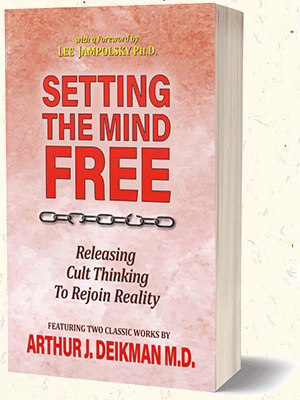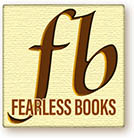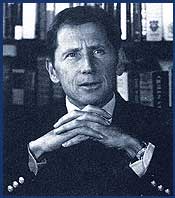NOW IN PRINT and DIGITAL!
 A timely revival of two classic works
A timely revival of two classic works
by an expert on cultism and the freedom of the mind
In these days when cult beliefs and behavior are animating large sectors of American society, the wisdom of Arthur Deikman could not be more timely and applicable.
Fearless Books is pleased to announce the reprinting of two classic works in one volume by a pioneering psychiatrist and a leading voice in the founding of transpersonal psychology, whose wisdom not only outlived him but grows more relevant with the passing of time.
In The Wrong Way Home: Uncovering the Patterns of Cult Behavior in American Society, Dr. Deikman examines the mindset of cults in depth via substantial interviews with cult members, and then offers a broader examination of how cult attitudes and behavior are widely expressed in corporate, business, and mainstream religious environments, not just esoteric cults with small followings. "It is uncomfortable recognizing this in ourselves and our society," wrote novelist Doris Lessing in her endorsement of this book. "But if we are to be adult citizens, self-reliant, able to resist manipulation, then we have to take this step into greater sophistication. I learned a great deal from The Wrong Way Home..."
Personal Freedom: On Finding Your Way to the Real World takes the issues of "freedom of the mind" to the individual level, sharing principles and techniques from Zen and Sufism as well as modern psychotherapy to unlock the invisible prisons of belief and habitual thinking that we create for ourselves. Arguing that we create false identities based largely on watching and imitating others, rather than looking deeply at ourselves, Dr. Deikman reminds the reader that "you are the lever you can use that no one else possesses, and your place is occupied by you alone. What place is yours? Where and how will your energy flow when you set it free? Your real life is there awaiting you."
SETTING THE MIND FREE brings these two priceless works back to life in one volume, presented by Fearless Books. This updated omnibus edition features a substantial Foreword by best-selling author and psychologist Lee Jampolsky, Ph.D.
______________________________________________________
ARTHUR J. DEIKMAN M.D. (1929-2013) studied physics at Harvard University before training as a psychiatrist, inaugurating a career as a pioneer investigator of mystical states from the 1950s onward. He developed a humane form of psychotherapy for patients with psychosis, and was one of the earliest investigators to discriminate between pathological and genuinely advanced mystical states of consciousness. Dr. Deikman served as a clinical professor of psychiatry at the University of San Francisco. Besides his clinical work, he had a lifelong personal interest in the intersection of mysticism and the scientific study of the mind. Besides The Wrong Way Home and Personal Freedom, republished in a new volume from Fearless Books, he also authored The Observing Self: Mysticism and Psychotherapy, still in print from Beacon Press. A comprehensive collection of Dr. Deikman's papers and published articles is available in Meditations on a Blue Vase (Fearless Books, 2014).
______________________________________________________
E X C E R P T Sfrom the Foreword by Lee Jampolsky, PhD:
To find healing and to rise to our best, we must see what wounds us and drives us apart. To be truly free, we must know what freedom is and what imprisons us that is of our own making. Deikman’s books hold a contemporary relevance that is uncanny; in some ways, he was writing prophetically, knowing the issues of cult thinking vs. independent and the importance of genuinely free thought. Perhaps unpopular to frame it as such, but we live in a time when mass-cult thinking is so prevalent as to be a critical issue in the direction of politics and the fabric of society. The illusion of independence is frequently and fervently defended with the argument that we are “free” to think whatever we want, regardless of how unfounded, unscientific, or ultimately destructive it is. This kind of freedom is not free at all; it is bondage to egoistic insanity that has us barreling toward the proverbial cliff. This book will acquaint you with both the problems and the solution, but be forewarned, to fully grasp and implement his profound teaching requires us to step forward with unique honesty and grit.
This book is not political or spiritual in the usual sense. Still, it may be the most honest and insightful political writing you have ever read and the most impactful and insightful to the spiritual core of who you are. Amid our most significant challenges, we can become more compassionate beings, more aware of our power to free ourselves in ways we did not realize before. I enjoy stories that tell of meeting adversity in ways that require hard work to overcome. When I read Deikman’s words, I am reminded that my freedom comes from my efforts to examine my thoughts and behavior to reach independence, different from what we see argued for in most world struggles. This sort of work is hard, plain and simple. It is also necessary if we want to individually and collectively wake from this delusion we have mistakenly called clear and independent thinking and freedom.
Over the decades, I have come to see Arthur Deikman as a pioneer in the art and science of showing us ourselves and how to rise to our highest human potential. His stories, examples, and direct teachings offer a profound structure to know our purpose, recognize our need for societal healing, and hope and motivation for peaceful global relations. In short, he teaches us to think and live sanely. He does not point a blaming finger; he teaches us how to work on ourselves to heal our fears, reduce greed, and see the results of vanity and ego-based actions. It is not easy to tap a person on the shoulder to point out how they act in ways that are irrational and blind, but Arthur Deikman’s life work effectively does this and more....
________________________________
from Chapter 1 by Arthur Deikman:Usually, in psychiatry and psychology, the wish to be taken care of (to find a home, a parent) is called dependency and this is a rather damning label when applied to adults. Adults are not supposed to be dependent in that way, relying on another as a child would rely on a mother or father. We are supposed to be autonomous, self-sustaining, with the capacity to go it alone. We do recognize that adults need each other for emotional support, for giving and receiving affection, for validation; that is acceptable and sanctioned. But underlying such mature interdependency is the longing of the child, a yearning that is never completely outgrown. This covert dependency — the wish to have parents and the parallel wish to be loved, admired, and sheltered by one’s group — continues throughout life in everyone. These wishes generate a hidden fantasy or dream that can transform a leader into a strong, wise, protective parent and a group into a close, accepting family. Within that dream we feel secure.
The dependency dream has great strength and tenacity. It should be recognized as a permanent part of the human psyche even though in adults it ceases to be as visible as it is in childhood. This dream is dangerous because in its most extreme form it generates cults and makes people vulnerable to exploitation, regression, and even violence. Even in the less intense, less obvious manifestations which occur in everyday society, the dependency dream may impair our ability to think realistically. If we recognize our dependent wishes for what they are we can make appropriate corrections in thought and behavior, but usually we do not. Rather, we engage in thinking and behavior more subtle than that of the People’s Temple but qualitatively similar....
As I studied the psychological mechanisms that made the cult experience possible, I began to recognize uncomfortably familiar processes. A little reflection provided many specific instances of my own compliance — conscious and unconscious — with the values and preferences of my peers, compliance that I had rationalized or ignored because I preferred to think of myself as very independent. Since no radical change or disruption of my life occurred and I was not acting at the behest of a charismatic leader or occult group, it had not occurred to me that I might be behaving like one who has been captured by a cult.
Nevertheless, I now realize that the motivations and manipulations constituting cult behavior are present in varying degrees in my own life and that they play a role in the lives of most of us as they operate in our educational systems, the business world, religion, politics, and international relations. Just as many of the more notorious cults have proven to be costly and destructive, so ordinary cult behavior is damaging and harmful to some degree wherever it occurs, no matter how normal its outward appearance....
C L I C K T O :
Books from Fearless • Fearless HOME





